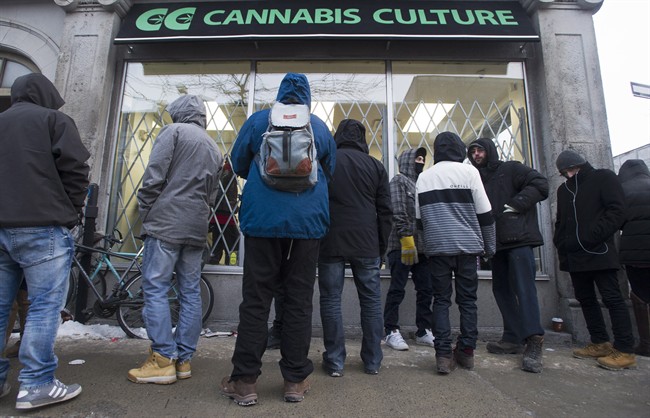Government officials confirmed on Monday that legislation to legalize marijuana is coming the week of April 10, reportedly with the aim of making the drug legal in Canada by July 1, 2018.

But as the legislation winds its way through the House of Commons, what will happen to Canadians caught with pot in the interim, or those who have been charged with possession in the past?
READ MORE: Marc and Jodie Emery charged in Toronto amid marijuana dispensary raids
The Liberals have made it crystal clear that decriminalization before the law passes isn’t in the cards. As of right now, you can still be arrested and charged if police catch you with even small amounts of marijuana.
The government has argued that if it decriminalized possession before the new laws regulating pot are in place, Canadians would purchase even more unregulated weed, endangering their health and filling the coffers of organized crime.
“Apart from access for medical users, [marijuana] is currently not legal. And those laws will remain in place until the law changes,” Health Minister Jane Philpott reiterated Monday morning.
Last spring, the NDP tried to change the government’s mind, tabling a motion in the House of Commons that called for police to stop charging anyone caught with a small amount of pot intended for personal use (it would have remained illegal to sell it).
WATCH: Trudeau asked why marijuana isn’t decriminalized yet

Their argument, shared by pot activists and even some legal experts, was that people were getting stuck with criminal records (which could haunt them for years as they tried to find jobs or travel) for a offence that was about to be eliminated from the books.
In a policy paper published last April, the C.D. Howe Institute, a prominent think-tank, agreed that government money and resources were likely being wasted on simple possession charges.
READ MORE: Marijuana legalization timeline: Dispensary raids and major announcements
Marijuana activist Jodie Emery, the so-called Princess of Pot, says she wants to see an immediate moratorium on marijuana-related arrests until July 2018.
“A year is still a long time for people to get arrested and to get criminal records for marijuana,” Emery said Monday.
“Unless somebody is actually dangerous or violent, a threat to society, the police should not be spending time going after them.”
Law vs. reality
While the law of the land isn’t changing, its application on the ground may be a different matter.
According to the latest data available from Statistics Canada, the overall rate of police-reported offences involving the possession, trafficking, production and distribution of marijuana decreased 15 per cent between 2014 and 2015.
That was due mainly to decreases in the rates of pot-related offences in Ontario (-16 per cent) and British Columbia (-17 per cent), the agency said.
The former head of the Canadian Association of Chiefs of Police, Clive Weighill, predicted last year that the number of charges for simple possession would keep dropping as Canada waits for legislation.
WATCH: Jodie Emery reacts to Ottawa’s plans to legalize marijuana by 2018

But the current CACP president, Mario Harel, said his members are committed to enforcing the rules.
“Most of the time, with police seizures, even in dispensaries, we find mould in the marijuana. So there’s a health issue, there’s a public safety issue,” Harel explained.
“And organized crime still have their hands on that market. So that’s why I think we should apply the law as it is right now … If it becomes a free-for-all, it’s going to open the market to organized crime.”
Police have seemingly focused their efforts recently on the hundreds of marijuana dispensaries popping up across Canada, including ones owned by Emery.
“Ever since Bill Blair, the (former) Toronto police chief, was put in charge of the legalization file last year, we’ve seen a crackdown by police forces across this country,” she said.
The Toronto police force, one of five major Canadian police forces Global News contacted on Monday, confirmed that its officers will continue to enforce the law until new legislation comes into effect. The force could not provide statistics for the number of possession arrests made over the past six months. Vancouver’s force also confirmed it wouldn’t change its enforcement practices.
The other police forces did not respond.
Pardoning past offences
As for Canadians who have already been convicted of pot possession, they are already eligible for a pardon — but it takes time.
At the moment, someone convicted of simple possession of up to 30 grams of marijuana can apply for what’s known as a record suspension five years after their sentence is completed.
An internal Public Safety Canada briefing note, released last year to The Canadian Press under the Access to Information Act, said the issue of record suspensions will be “important to consider during the marijuana legalization discussions.”
The Liberals have not committed to eliminating the criminal records of Canadians charged before the new law is in place, however, and it’s unclear if any such provisions will be included in the bill.
- Budget 2024 failed to spark ‘political reboot’ for Liberals, polling suggests
- Train goes up in flames while rolling through London, Ont. Here’s what we know
- Peel police chief met Sri Lankan officer a court says ‘participated’ in torture
- Wrong remains sent to ‘exhausted’ Canadian family after death on Cuba vacation




Comments